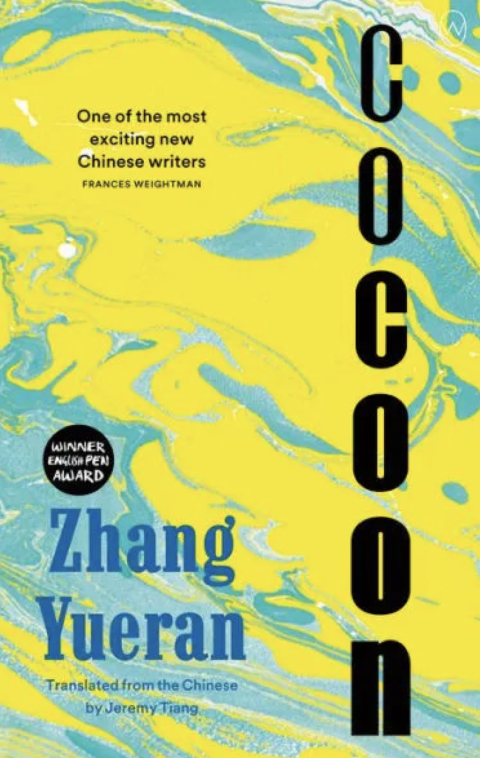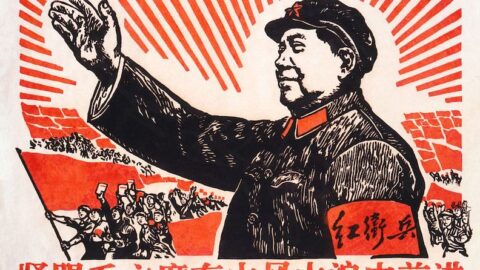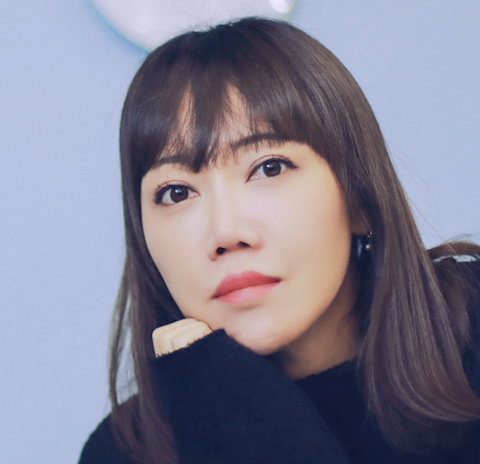Reading Zhang Yueran’s fearlessly probing and introspective new novel Cocoon is like watching a two-hander where both actors remain on stage, concealed behind scrims, for an entire play. While the two performers are telling one story, they never directly interact with or react to each other, and only the current speaker is illuminated while the other sits invisible, silent in the darkness.
Li Jiaqi and Cheng Gong, the twinned narrators of Cocoon, published in China in 2016 and newly translated into English by Jeremy Tiang, were childhood friends but haven’t seen each other for 18 years, since the 11-year-old Jiaqi ran away to Beijing in search of her father. The story opens with Jiaqi returning to Jinan, the capital of Shandong Province south of Beijing, to care for her grandpa, Li Jisheng. The elder Li was once “the most famous heart surgeon in China,” but he is now bedridden and dying of lung cancer. After Jiaqi dismisses his home aide, who had been abusing her position to host parties at Li’s stylish “white mansion” on the medical school campus, his condition takes a turn for the worse and he is soon unresponsive, depriving Jiaqi of the conversations she had imagined having with him about “the tragedy of our family, how he became the person he is now, how [she] grew into [her] current self.” Determined to pursue these threads, Jiaqi seeks out Gong, whom she finds still lives with his auntie near campus.
 Despite having cared for her deeply when they were younger, Gong tells Jiaqi that he “had truly never hoped to meet [her] again.” He now believes that the friendship they’d “thought was indestructible was in fact utterly fragile. It had been wrong from the beginning, a tree growing in the middle of a road, doomed to be cut down sooner or later.” He calls their childhood a “fog made of secrets” that eventually drove a wedge between them, but the two agree to talk it out until all their secrets have been exposed, their potential for harm eliminated.
Despite having cared for her deeply when they were younger, Gong tells Jiaqi that he “had truly never hoped to meet [her] again.” He now believes that the friendship they’d “thought was indestructible was in fact utterly fragile. It had been wrong from the beginning, a tree growing in the middle of a road, doomed to be cut down sooner or later.” He calls their childhood a “fog made of secrets” that eventually drove a wedge between them, but the two agree to talk it out until all their secrets have been exposed, their potential for harm eliminated.
The ranging conversation lasts deep into the night and stretches the entirety of the novel, except for a brief coda, and addresses themes of legacy, violence, and compassion, as well as the effects these forces have on one’s ability to give and receive love. Jiaqi and Gong speak in alternating chapters, exploring everything from their recent pasts to their childhood years together to their parents and grandparents. It soon becomes clear that the origins of both the burdens and the secrets the estranged friends continue to carry lie in their ancestors’ pasts.
Those older generations saw their futures forged — and their fates perhaps dictated — during the “free-for-all of the Cultural Revolution,” which lasted from 1966 until Mao’s death in 1976, “a time when bad people did bad things, but good people did bad things too.” As Gong’s auntie explains to him, “You don’t know what it was like back then, you might get paraded through the streets or dragged into a struggle session at the drop of a hat, they’d denounce you for this today and that tomorrow, you never knew when the arrow was going to point at you.”
While Jiaqi’s grandpa earned his way to the height of his profession with hard work and talent, Gong’s granddad, Cheng Shouyi, was installed as deputy director of the University Hospital as a reward for his fearsome and lethal combat performance during the Second Sino-Japanese War, which spanned World War II. Once the Cultural Revolution was launched, the elder Cheng, as a loathed member of management, soon found the arrow pointing in his direction. He was taken and beaten, after which someone drove a two-inch iron nail into the side of his head. By the time it was noticed and removed, he was “no different to a corpse,” except for having a heartbeat and blinking his eyes. He remained that way for 22 years until his body disappeared, “spirited away from his hospital room in the middle of the night.”
The violent reverberations from that nail resound throughout both narrators’ lives. Gong’s granny was born to a penniless country family that she fled when her future husband’s military regiment came through their small village. After her husband was incapacitated, however, “Love would never come again, leaving her with hatred, her only sustenance.” That hatred grew in her son, Gong’s father, as well. He joined the Red Guards at age 13, and “sprayed his uncontrollable rage in all directions.” When the Cultural Revolution ended, he was never able to change his behavior, ending up a drunkard who beat his wife and served time in prison. Gong’s mother lived her life in an “atmosphere of terror,” even before her abusive marriage. Soon after her birth, her grandmother and father got ill and died and “her mother starved to death during the Three Years of Natural Disasters.” She endured her husband’s beatings for a while, but one day Gong woke up and she was gone, leaving him to be raised by his granny and auntie. After Jiaqi leaves Jinan in 1993, Gong feels abandoned, and realizes he too has inherited his family’s legacy of violence.
 Even before he lashes out, Gong is aware of the reputation that follows him. In an earlier episode, he and Jiaqi are hanging out with their friends Dabin and Zifeng at Dead Man’s Tower, where Gong’s granddad and countless others were beaten during the Cultural Revolution. The four kids are discussing their goals in life. Dabin and Zifeng choose careers, as a cop and an author. Gong, however, reflects a desire to be free of the stigma of the past, by declaring that he wants “to gain people’s respect.” Jiaqi wants something even more elusive, “lots and lots of love.”
Even before he lashes out, Gong is aware of the reputation that follows him. In an earlier episode, he and Jiaqi are hanging out with their friends Dabin and Zifeng at Dead Man’s Tower, where Gong’s granddad and countless others were beaten during the Cultural Revolution. The four kids are discussing their goals in life. Dabin and Zifeng choose careers, as a cop and an author. Gong, however, reflects a desire to be free of the stigma of the past, by declaring that he wants “to gain people’s respect.” Jiaqi wants something even more elusive, “lots and lots of love.”
Her family was a product of the Cultural Revolution as well. Her mother was a gorgeous “country maiden” from the village where her father was sent as part of Mao’s policy of “sending Educated Youths to the farming villages.” Their marriage was loveless, but Jiaqi’s father used it to rebel against his own father, who wanted him to marry a professor’s daughter who was a violinist. Eventually Jiaqi came to see her mom through her father’s eyes, as “an irredeemable bumpkin,” partly because she understood that her father’s lack of love for her mother meant that he would never love his daughter either.
Jiaqi’s father was a poet and a college professor in Jinan, until he was forced to resign after defending some of his students who had, presumably, participated in the 1989 Tiananmen Square protests. The next year, when Jiaqi was just eight, her parents moved to Beijing so her father could pursue a business career. Jiaqi stayed behind in the care of her grandparents, pining for the love of her father that was even more elusive in his physical absence. That feeling of abandonment set the tone for the rest of her life, as she explains to Gong, “Earlier on, you said everyone has a moment when their fate is activated, and after that they’re being led around by a rope. For me, that probably happened when I turned eight.”
During those ensuing years of living with her grandparents, Jiaqi “was completely out of control […] Looking back, it might have been the happiest time of my life, though I can’t remember how that actually felt. Memory is selective, and my memory would rather cling to suffering.” That suffering came to dominate her life after her father’s sudden death when she was 11. Beginning in college and continuing until the months before her return to Jinan, Jiaqi sought out her father’s former students, co-workers, and associates in a bid to understand him and, as always, to gain some semblance of his love. Her most serious relationship falls prey to this obsession, and her boyfriend, as he’s breaking up with her, lays the blame solely on her inability to loosen herself from the rope tying her to the past. “You insist on occupying a history that doesn’t belong to you. It’s a form of escape because you can’t deal with your actual life. You don’t know why you exist, so you hide in your father’s era. You feed on that generation’s scars. Like a vulture.”
 That concluding simile is characteristic of Zhang’s writing throughout Cocoon. While the novel is almost entirely concerned with human relationships, the characters remain closely tied to the natural world, starting with the novel’s title and the above quotations about the “tree” and the “fog.” Death hovers over Jiaqi’s grandpa “like a flock of bats.” During a night out with one of her father’s former students, “Alcohol turned [her] tongue into a snake.” And Gong, recalling the early days of his friendship with Jiaqi, tells her that “Sometimes, without warning, you’d let out a shriek, not drawing breath, until your voice gave out. Then you’d look smugly at us, as if you’d torn a hole in the sky.”
That concluding simile is characteristic of Zhang’s writing throughout Cocoon. While the novel is almost entirely concerned with human relationships, the characters remain closely tied to the natural world, starting with the novel’s title and the above quotations about the “tree” and the “fog.” Death hovers over Jiaqi’s grandpa “like a flock of bats.” During a night out with one of her father’s former students, “Alcohol turned [her] tongue into a snake.” And Gong, recalling the early days of his friendship with Jiaqi, tells her that “Sometimes, without warning, you’d let out a shriek, not drawing breath, until your voice gave out. Then you’d look smugly at us, as if you’d torn a hole in the sky.”
As Jiaqi and Gong continue to separate the nested matryoshka dolls of their pasts that Jiaqi’s persistent dream urges her to explore — “Open it, open it” — they find that their secrets are hidden in the same spots, and their desires, for respect and love, may be commensurate if they can break free of their pasts and their need to focus on suffering.
While Deng Xiaoping’s government in 1981 officially criticized the abuses of the Cultural Revolution, calling it “responsible for the most severe setback and the heaviest losses suffered by the Party, the state and the people” since the nation’s founding, the type of nuanced, honest discussion found in Cocoon is not happening publicly in China today. Any introspection or reappraisal of the past is absent from their National Museum and an under-the-radar institution dedicated to an open accounting of the Cultural Revolution was shuttered in 2016.
Zhang, who was born in 1982, is part of generation for whom these questions likely have some urgency, because the people who can answer them — their parents and grandparents — are nearing the ends of their lives. But Cocoon is critical not only of China’s past, but its present as well. When Gong discusses the damage that secrets can cause, he wonders if their intrigue stems from the fact that “in this country, destruction is always seen as the highest form of creation.” And Jiaqi, while contemplating joining her cousin in the United States, muses that her “ancient country was under a thick layer of dust, and leaving would feel like being cleansed.”
In a brief introduction to the novel, Zhang writes that while she cared about the outcome of the book while she was crafting it, she truly believed that the “process of exploration and discovery was more important to [her] than the final product.” It is a remarkably frank journey that she lays out IN the pages of Cocoon, and one that hopefully will lead many readers to follow where she takes them.
[Published by World Editions on October 4, 2022, 328 pages, $18.99 paperback]